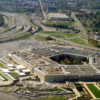The US government has always turned to the nation’s scholars and intellectuals for help in times of national crisis or emergency. Many of our most prized scholarly organizations today were born during previous conflicts. President Lincoln established the National Academy of Sciences amidst the Civil War. Likewise, President Wilson created the National Research Council during World War I. During the Second World War, President Franklin Roosevelt established the Office of Scientific Research and Development where scientists and researchers became “full and responsible partners for the first time in the conduct of war,” according to noted scientist Vannevar Bush. What each of these Presidents realized is that the US government, especially in difficult times, requires the assistance of one of this nation’s greatest assets — the collective knowledge and unparalleled expertise that resides in our extensive network of world-class colleges and universities.
Today, we face similar circumstances. While the threat may not be as grave as during the darkest days of World War II, the need for specialized knowledge and expertise is perhaps greater. Our challenge today is not so much that of developing new weapons, important though those efforts may be. Rather, our challenge today is to understand the nuanced linkages within and across societies that we in America are relatively unfamiliar with. We need, for example, to understand the long term challenge posed by extremist ideology and what this means in nations experiencing rapid demographic changes. Language skills, cultural knowledge and understanding, understanding the attitudes of different populations, these are the critical tools that the US government needs to more fully integrate into our kit bag of capabilities for the future.
This, in essence, is what the Minerva Initiative is all about. It is about laying the important foundations today to enable a more robust and long-term relationship between the Department of Defense and our nation’s diverse community of social science researchers. Minerva is about leveraging the so-called “soft power” potential that resides across this nation (and indeed across the globe) to help our government prevail in the face of challenges that are more complex, more interrelated and potentially more deadly than any we have previously faced. As a result, cultural knowledge and regional expertise become critical enablers that we must add to our quiver of capabilities to help us deal with this rapidly changing world.
“No one should ever neglect the psychological, cultural, political and human dimensions of warfare,” Secretary of Defense Robert Gates wrote in his recent article in Foreign Affairs. The Secretary is concerned that there is no “deeply rooted constituency inside the Pentagon or elsewhere for institutionalizing the capabilities necessary to wage asymmetric or irregular conflict — and to quickly meet the ever-changing needs of forces engaged in these conflicts.” Minerva is just one of several initiatives that Secretary Gates has launched in recent years in an attempt to redress this imbalance. Secretary Gates has also urged more funding be added to the Department of State’s annual budget and that something akin to the Cold War-era US Information Agency should be re-established to help in 21st Century strategic communication efforts.
As noted above, the US government has long played a healthy and constructive role in the funding of science and research across American colleges and universities. Recently, the Department announced it was boosting funding in the areas of physics, ocean sciences, chemistry, electrical engineering and the geo-sciences by an additional $400 million over the next five years. This is important work and these additional investments are surely needed.
But it should also be noted that the vast majority of DoD spending on university research is devoted to the physical sciences, both basic and applied. Relatively little funding, in comparison, has been devoted to the social sciences. This is a situation that Minerva intends to redress, albeit on a far more limited scale. In addition, one of the virtues of social science research, compared to the physical sciences, is that it is also relatively inexpensive. This enables the funding of a greater number of research projects for a smaller cost. Yet the payoff can be equally valuable.
Much has been written about Minerva in recent months, both in the media and as a result of our concerted outreach efforts. While the message has at times been distorted or misunderstood, I think it would be worthwhile to articulate here some of our underlying thinking regarding Minerva and attempt to answer some lingering questions like “Why the social sciences and why now?”
The need for Minerva stems partly from the cross-disciplinary challenges we see arising on the security horizon, combined with Secretary Gates’ intuitive understanding that the Department’s existing institutions must change to meet new demands. The Secretary has emphasized repeatedly that the Department must do a better job of reaching out to the vast reservoir of knowledge and expertise that resides across America’s academic research institutions. As the former President of Texas A&M, this is an issue the Secretary has first-hand experience with. For example, in the study of political Islam, there are individual scholars scattered all across the academic landscape. With Minerva, we would like to tap into this specialized expertise on critical problems and then enable these disparate researchers to network into larger communities of interest in order to gain insights into what their combined intellectual talents may produce.
The desire to create Minerva also comes from a recognition that the government must do a more thorough job of harnessing new academic disciplines to help in resolving many of the issues we face. Fields like history, anthropology, sociology and religious studies could be better leveraged to help in devising new approaches and unearthing innovative ideas to aid in solving the intertwined and complex challenges of the future. These are just a few of the academic disciplines that Minerva will engage in a more systematic and fulsome way.
To jumpstart Minerva this year, the Department piloted two complementary tracks of funding. One was a Broad Area Announcement (BAA), while a separate solicitation was issued by the well-respected National Science Foundation. The response from academia to these separate solicitations has literally been overwhelming: these two tracks yielded nearly 450 proposals for research. We have just completed selections for the BAA and we are extremely pleased with the results. I think you will recognize in the awardees some of your own peers and colleagues, all of whom are first- rate scholars and well-respected in their fields. The NSF is now in the process of evaluating proposals, and we are just as optimistic about the outcome of that process.
We envision that over time Minerva will support the development of cross-institutional research centers and multi-disciplinary research projects, that it will produce new areas of advanced study, generate new academic research papers and spin off numerous conferences and different types of publications and research archives. As we have pointed out before, all research will be unclassified and no government restrictions will be placed on research conducted under the Minerva Initiative.
By drawing on the knowledge, ideas and intellectual creativity of the nation’s universities, we intend to foster a new generation of engaged scholarship in the social sciences. While we fully expect this project to fuel new ideas and areas for exploration across the social sciences, in many ways the more overarching goal of Minerva is to build bridges and forge bonds between the Department and academia and lay the foundation for a sustained and enlightened dialogue.
To meet the demands of a changed world, the Department needs to pool the resources and talent of the nation together to surmount impending challenges. While there may be some limited drawback to expanding collaboration between DoD and academia, there may be significantly greater risks if we do not even attempt to do so.
In order to prevail over 21st century threats like jihadist extremism, ethnic strife, disease, poverty, climate change, failed and failing states and resurgent powers, we must in the succinct phrase of Secretary Gates “again embrace eggheads and ideas.”













